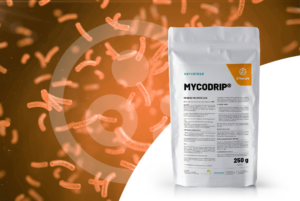There is no doubt that the main objective of farms is to obtain abundant harvests to meet the ever-increasing demand for food by the population and, in addition, to make the work of producers profitable.
During the second half of the last century, the main objective of the so-called green revolution was to meet the ever-increasing consumer demand for food. Thanks to the use of a great variety and quantity of agricultural inputs, both biofertilizers and phytosanitary products, this objective was achieved, but it had certain negative consequences for the environment. Examples of this are the effects on the ecosystem of synthetic phytosanitary products such as DDT or the progressive degradation of agricultural soils.
For decades, soil was considered as a physical support element for cultivation and attention was paid only to its mineral elements, without taking into account its biotic component.
RECOGNIZING THE IMPORTANCE OF SOIL FOR LIFE
Over time, agricultural soils have been losing their microbiota, have become unstructured and in many of them the organic matter content has practically disappeared. In addition to the loss of fertility, one of the worst consequences has been the increase in the pressure of pathogens and pests, due to the disappearance of their competitors and the appearance of resistance to synthetic compounds, to such an extent that today, in many soils, cultivation is unviable.
Today, we are facing a different scenario and although the main objective is still to achieve abundant crops, these must be obtained in a sustainable way and minimizing environmental damage.
Moreover, the evident awareness of preserving the environment and the growing consumer demand for residue-free products has led to an increasing number of farms using organic agricultural production methods. The current challenge for the European Union is to maintain production that meets the needs of the population in a sustainable manner, reducing, and in some cases eliminating, certain synthetic chemical inputs that are harmful to the ecosystem.
To restore and restructure soils, it is necessary to increase the percentages of organic matter and, more importantly, to recover the content of beneficial microorganisms (plant growth-promoting rhizobacteria and fungi). In order to achieve this, in general terms, several complementary ways must be followed, such as:
- Inoculate the soil with beneficial microorganisms. Apart from the quantity, it is also important to set aside different varieties of species or strains.
- On the other hand, quality organic matter, with an adequate C and N content, should be incorporated in order to stimulate and increase the quantity of microorganisms in the soil.
- Avoid the use of products that in any way negatively affect the growth of soil microbial flora.
BENEFITS OF REGENERATING
Regenerating and restoring fertility to a soil that has been seriously deteriorated after long periods of bad practices is a process whose duration will depend on its degree of degradation, but without any doubt, the benefits obtained in the future will compensate the time and work spent.
Biológica Nature specializes in the isolation, identification and reproduction on an industrial scale of beneficial microorganisms for use in agriculture. It has its own collection of bacteria and fungi that can be used as biofertilizers and soil regenerators, as well as other strains currently under study to test their usefulness. It also has its own production plant, consisting of 3 fermenters to produce biomass and formulate biofertilizers based on microorganisms.
Among other products, it has several formulations based on consortiums of different strains of rhizobacteria and fungi to improve the physicochemical and biological conditions of the soil, together with their biostimulant effect on the plant. With the use of these preparations, we will be able to have fertile and stable soils that will allow us to obtain abundant and quality crops.
These formulations are registered according to the current regulations for placing microbiological fertilizers on the market and authorized for use in Organic Agriculture.
Discover the B’NATURE range composed of a careful selection of products based on microorganisms and other special products developed exclusively by BIOLOGICA NATURE, our technological supplier.




